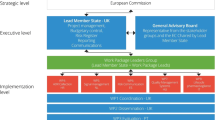Abstract
The European Union has thoroughly reformed its pharmacovigilance legislation in July 2012. Despite the changes, underreporting of adverse drug reactions remains a concern. This underreporting seems to be partially associated with incorrect customs and beliefs by healthcare professionals. Therefore, strengthening teaching and training in drug safety monitoring and reporting are essential. Sustained campaigns and education on pharmacovigilance are key elements to enhance its performance and effectiveness. In general, all healthcare professionals as well as patients should be more sensitized and empowered to contribute to pharmacovigilance programmes in order to improve drug safety.
Similar content being viewed by others
References
Anonymous. European medicines agency. New EU pharmacovigilance legislation—key concepts. http://www.ema.europa.eu/docs/en_GB/document_library/Other/2012/07/WC500129593.pdf Accessed 16 Aug 2013.
Hazell L, Shakir SA. Under-reporting of adverse drug reactions : a systematic review. Drug Saf. 2006;29(5):385–96.
Williams D, Feely J. Underreporting of adverse drug reactions: attitudes of Irish doctors. Ir J Med Sci. 1999;168(4):257–61.
Irujo M, Beitia G, Bes-Rastrollo M, Figueiras A, Hernández-Díaz S, Lasheras B. Factors that influence under-reporting of suspected adverse drug reactions among community pharmacists in a Spanish region. Drug Saf. 2007;30(11):1073–82.
Herdeiro MT, Figueiras A, Polónia J, Gestal-Otero JJ. Influence of pharmacists’ attitudes on adverse drug reaction reporting : a case-control study in Portugal. Drug Saf. 2006;29(4):331–40.
Lopez-Gonzalez E, Herdeiro MT, Figueiras A. Determinants of under-reporting of adverse drug reactions: a systematic review. Drug Saf. 2009;32(1):19–31. doi:10.2165/00002018-200932010-00002.
González-Rubio F, Calderón-Larrañaga A, Poblador-Plou B, Navarro-Pemán C, López-Cabañas A, Prados-Torres A. Underreporting of recognized adverse drug reactions by primary care physicians: an exploratory study. Pharmacoepidemiol Drug Saf. 2011;20(12):1287–94. doi:10.1002/pds.2172.
Avery AJ, Anderson C, Bond CM, Fortnum H, Gifford A, Hannaford PC, et al. Evaluation of patient reporting of adverse drug reactions to the UK ‘Yellow Card Scheme’: literature review, descriptive and qualitative analyses, and questionnaire surveys. Health Technol Assess. 2011;15(20):1–234. doi:10.3310/hta15200.
van Hunsel F, Härmark L, Pal S, Olsson S, van Grootheest K. Experiences with adverse drug reaction reporting by patients: an 11-country survey. Drug Saf. 2012;35(1):45–60. doi:10.2165/11594320-000000000-00000.
Inch J, Watson MC, Anakwe-Umeh S. Patient versus healthcare professional spontaneous adverse drug reaction reporting: a systematic review. Drug Saf. 2012;35(10):807–18. doi:10.2165/11631650-000000000-00000.
Rolfes L, Wilkes S, van Hunsel F, van Puijenbroek E, van Grootheest K. Important information regarding reporting of adverse drug reactions: a qualitative study. Int J Pharm Pract. 2013. doi:10.1111/ijpp.12056.
Durrieu G, Palmaro A, Pourcel L, Caillet C, Faucher A, Jacquet A, et al. First French experience of ADR reporting by patients after a mass immunization campaign with Influenza A (H1N1) pandemic vaccines: a comparison of reports submitted by patients and healthcare professionals. Drug Saf. 2012;35(10):845–54. doi:10.2165/11631800-000000000-00000.
Leone R, Moretti U, D’Incau P, Conforti A, Magro L, Lora R, et al. Effect of pharmacist involvement on patient reporting of adverse drug reactions: first Italian study. Drug Saf. 2013;36(4):267–76. doi:10.1007/s40264-013-0028-8.
Marques J, Ribeiro-Vaz I, Pereira AC, Polónia J. A survey of spontaneous reporting of adverse drug reactions in 10 years of activity in a pharmacovigilance centre in Portugal. Int J Pharm Pract. 2014;22(4):275–82. doi:10.1111/ijpp.12078.
Moore N. The past, present and perhaps future of pharmacovigilance: homage to Folke Sjoqvist. Eur J Clin Pharmacol. 2013;69(Suppl 1):33–41. doi:10.1007/s00228-013-1486-8.
Biagi C, Montanaro N, Buccellato E, Roberto G, Vaccheri A, Motola D. Underreporting in pharmacovigilance: an intervention for Italian GPs (Emilia-Romagna region). Eur J Clin Pharmacol. 2013;69(2):237–44. doi:10.1007/s00228-012-1321-7.
Gonzalez-Gonzalez C, Lopez-Gonzalez E, Herdeiro MT, Figueiras A. Strategies to improve adverse drug reaction reporting: a critical and systematic review. Drug Saf. 2013;36(5):317–28. doi:10.1007/s40264-013-0058-2.
Pal SN, Duncombe C, Falzon D, Olsson S. WHO strategy for collecting safety data in public health programmes: complementing spontaneous reporting systems. Drug Saf. 2013;36(2):75–81. doi:10.1007/s40264-012-0014-6.
White RW, Harpaz R, Shah NH, DuMouchel W, Horvitz E. Toward enhanced pharmacovigilance using patient-generated data on the internet. Clin Pharmacol Ther. 2014;96(2):239–46. doi:10.1038/clpt.2014.77.
Pontes H, Clément M, Rollason V. Safety signal detection: the relevance of literature review. Drug Saf. 2014;37(7):471–9. doi:10.1007/s40264-014-0180-9.
Acknowledgments
We thank the European Society of Clinical Pharmacy (ESCP) for having supported the workshop “Adverse Drug Reactions—Applying Theory to Practice” at the 41st ESCP Symposium in October 2012. We are also grateful to the participants of the workshop for completing the survey.
Funding
None.
Conflicts of interest
None.
Author information
Authors and Affiliations
Rights and permissions
About this article
Cite this article
Steurbaut, S., Hanssens, Y. Pharmacovigilance: empowering healthcare professionals and patients. Int J Clin Pharm 36, 859–862 (2014). https://doi.org/10.1007/s11096-014-0004-0
Received:
Accepted:
Published:
Issue Date:
DOI: https://doi.org/10.1007/s11096-014-0004-0




